What Is Copywriting? How to Start + Best Tips (2024)
What exactly does a copywriter do? Learn the copywriting basics in this guide, with examples, tips, and easy ways to find copywriting jobs.
 April 10, 2024
April 10, 2024 21 minute reading
21 minute reading
Advertising your products and services doesn't always get you the results you need. Most of the time, it's because the words on your website, in your marketing emails, or on your social media platforms are poorly written or ineffective at getting people to take the final step of making a purchase.
This is a huge factor for success in any industry. Whether you sell DIY home tools or offer insurance services, the way your written content is formulated matters more than you think.
Enter copywriting. It's a fancy word for writing that you use in marketing strategies to improve sales and conversions.
Find a copywriter for hire
What is copywriting?
Copywriting involves creating compelling text that effectively markets a product, service, or concept to a target audience. It aims to persuade readers to take desired actions, like buying a product, attending an event, or subscribing to a mailing list.
Understanding copywriting
Copywriting is one of the most important elements of advertising and marketing. It's the process of writing persuasive words (known as copy) that inspire or motivate people to take a specific action.
It’s different from content writing. A content writer produces longer, well-written material for company blogs or publications.
Some examples of copywriting:
When you open a magazine and there's a full-page advertisement selling perfume, the words on that page are the result of copywriting.
When you go to a website that prompts you to buy something, the words on that page are the result of copywriting.
You can find copies in print, online, and even being read on television or over the radio. Copywriting is almost everywhere you look and listen.
Behind every piece of copy is a copywriter. Copywriters are individuals who are trained to craft words in a way that will connect with the target audience and move them to do something. Some may also use AI content writing tools to help spark their creativity.
Most businesses hire an in-house copywriter or on a contract basis to help them communicate with the world and grow.
What are the benefits of copywriting?
Being a business owner doesn't mean you're an expert copywriter. It takes specific skills and the right frame of mind to create copy that'll accomplish the right goals in the right place at the right time.
Businesses must sell products or be hired for services to succeed. Good copy helps. Whether it's ads, social media shares, landing pages, or social media, the goal is for people to take action. Good copywriting converts leads into paying clients.
There's a progression of positive things that good copy does for your business:
First, it makes an emotional impact on potential clients with words.
This emotional impact makes them feel like they can relate to your brand.
When they relate, they’ll feel like your brand can solve their problem or pain point.
The call-to-action motivates them to make a purchase.
This leads to increased sales and conversions for your business.
Hiring a copywriter can also help you:
Write powerful, effective copy for your specific business needs
Ensure your copy is free of grammar and spelling errors
Release the tension of having to write the copy yourself
Save you and your employees time destined for other tasks
As you see, copywriting has an important role in the success of your business. That's why it has to be done strategically. Refreshing the copy for your business in the right direction can improve conversions considerably.
What exactly does a copywriter do?
A copywriter writes words that move an audience to take action. There are many different types of copywriting. However, at the base of all of them is the act of studying a specific audience and understanding their needs and desires.
Then, a copywriter strategizes a way to best connect with the audience, show the audience their problem is understood, and present a solution.
Top skills a copywriter for the U.S. market must have are:
Strong writing abilities: Craft clear, concise, and engaging copy with proper English grammar and punctuation.
Understanding target audiences: Analyze and empathize with readers to tailor content to their needs and desires.
Persuasive storytelling: Use storytelling and persuasive techniques to motivate readers to take action.
Adaptability: Write for various industries, formats, and platforms, adjusting tone and style accordingly.
Research and analytical skills: Conduct research and analyze data to create informed, accurate, and resonant copy.
Depending on your needs and budget, you can hire a junior copywriter or someone who specializes in a particular type of copy or a certain industry. You can also work with a freelance AI content writing specialist to speed up production with the help of artificial intelligence.
Do copywriters make good money?
Copywriters can make good money, but the income largely depends on their experience, industry, location, and the type of projects they work on.
The U.S. Bureau of Labor Statistics (BLS) reported the median annual wage for writers, including copywriters, at $91,560 as of 2022. The lowest 10% earned less than $39,610, and the highest 10% earned over $160,000.
Freelance copywriters have the potential to earn more depending on their rates, client base, and workload. Highly skilled freelancers can earn between $50,000 and $150,000 per year, with top-tier copywriters earning even more.
What does a copywriter create?
A copywriter is a person who provides the words for a variety of assets including:
Webpages
Blogs
Ads
Social media posts
Emails
Posters
Billboards
Case studies
They use the medium of writing to inform, engage, impact, and/or persuade audiences. They may also use AI content creation tools to bring these assets to life.
The goals can vary from raising brand awareness to positioning a business or organization as an authority, to closing sales.
💡 Learn how to build and monazite a blog with our in-depth blog monetization guide.
The copywriter job description
Copywriters, in general, do a little bit of everything, including:
Writing content with the intent of informing, educating, or inspiring an audience
Writing copy to move readers to action
Researching to find information, statistics, keywords, topics, and brand information
Editing and proofreading to refine grammar, style, readability, accuracy, voice, tone, and punctuation
Working as a project manager, which involves ideating topics, working with other creators, writing, editing, revising, and publishing
It's a demanding role that requires a high level of hard and soft skills.
Who needs copywriters?
Every business or organization that plans to communicate with its audience needs a copywriter. From sole proprietors to large enterprises, no company is too large or small. Copywriters can find work with:
Solopreneurs: Individuals who start and run their own businesses independently like interior designers, writers, party planners, graphic designers, and coaches.
Marketing agencies: Companies with teams that help a variety of clients with the many aspects of marketing.
Small businesses: Small businesses that are privately owned and generate less annual revenue and have fewer employees than guidelines set by the Small Business Administration. Those limits vary by industry.
Enterprises: Large corporations with hundreds or even thousands of employees.
Fortune 500 companies: The 500 largest U.S. companies ranked by Fortune magazine.
Brick-and-mortar retail stores: Traditional street-side businesses offerings products and services.
Startups: Companies in the early stages of operations, founded by one or more entrepreneurs developing a product or service.
Non-profit organizations: Organizations that don't operate for a profit, such as public charities, foundations, trade organizations, and social advocacy groups.
Online retailers: Companies that sell goods or services through the internet.
The need for copywriting persists no matter the business type or niche because a fundamental part of running a business is driving a specific action from an audience.
To drive action, you need people to be aware of your company and need to guide them down the path you want them to take. Crafting words that effectively show what an organization is about while influencing the audience in a specific way requires knowledge and skill. Each piece of copy created should fit into the larger puzzle of the brand's identity and overall strategy.
Copywriters understand the big picture, including the brand identity and the buyer's journey, and then craft many types of copy that work together to achieve the business's goals. They help to properly articulate everything including:
The fundamental components of a company's brand like the mission, vision, and core values.
The words that will appear on the company's fixed assets like their website and social profiles.
And the pieces required on an ongoing basis like press releases, social media posts, blogs, and video scripts.
If you're looking for a place to find copywriting work, you'll have no shortage of options. From mom and pop shops and investment firms to dentists and doctors—take your pick.
The key is finding a niche you enjoy writing about that’s profitable and in high demand. Then, become an expert in the area, earning higher rates and more inbound business.
Long story short, everyone in business can benefit from hiring a copywriter.
Find an SEO copywriter for hire
Types of copywriting
Marketing
A marketing copywriter is a creative mind behind every word a business writes that intends to move people to action.
In the '50s and '60s, copy took the form of catchy jingles, slogans, and ads. While copywriters may still be behind those creations today, many write in various forms that are published on the internet as part of digital marketing campaigns.
These campaigns often include writing brand identity guides, website pages, product descriptions, whitepapers, blogs, social posts, emails, and other marketing materials. A marketing copywriter is even behind the content you’re reading right now.
While a product description or website's About page may seem simple, there’s a lot that goes into its development. Copy must speak to the desired audience in the right tone with impactful words that drive tangible action.
See how ToyFight, a creative agency, uses their About page to become relatable to the reader. You can see from the copy that the founders are fun, down-to-earth, and creative.

Marketing copywriters often have:
Years of experience
Creative minds
Strong research skills
Excellent time-management skills.
They should also understand marketing fundamentals and psychology, and may have a college degree in a related field.
These copywriters are always on the lookout for new trends and insights, and will understand things like AI in content marketing, benchmark conversion rates for campaigns, and more.
💡 Content marketing is always evolving. To help you keep up, we've assembled 10 content marketing trends for small businesses in 2023
In many cases, they work together with founders, marketing strategists, designers, and developers to bring a company or organization's vision to life. Further, they may specialize in a particular type of copy like email marketing campaigns and may not offer other types.
At the end of the day, marketing copywriters do much more than just write words. They understand how to analyze a business and its product or service to identify its differentiating factors. Further, they can step into the shoes of a brand, and craft words that’ll engage, inform, educate, and inspire the target audience.
SEO
SEO stands for search engine optimization, and some copywriters specialize in this type of copy. SEO-optimized copy is carefully crafted to appeal to the human audience while also sending all the right signals to the search engines.
Why? Because then your content will appear higher on search engine results pages, driving more traffic to your page. More traffic means more opportunities to close sales.
Optimizing copy for search requires in-depth knowledge of SEO best practices including using the right keywords in the right places, properly using headers, and matching the copy to the reader's intent. SEO copywriting is needed for web content, product descriptions, service descriptions, articles, and blogs.
💡 Master writing for SEO with our list of top 10 SEO writing techniques.
Sales
Sales copy is directly focused on closing the sale at the moment. Sales copywriters must understand the target audience in-depth and how a product or service could benefit them.
They need to dig into the subconscious of the audience, understanding why they really buy.
Then, they walk alongside the audience, addressing their pain points, empathizing with them, and showing how their problem can be resolved in a way that’s relatable and engaging. Nobody wants to feel like they’re being sold.
Some places you'll find sales copy are on:
Websites
Sales pages
Direct response letters
Email marketing campaigns
Social media ads
Google ads
Product pages
Service pages
Sales letters
LinkedIn posts
Print ads
Billboard ads
Creative
Creative copywriting requires not only getting the information across, but getting it across in a way that’s attention-grabbing, interesting, and memorable. It requires strategic, out-of-the-box thinking.
A great creative copywriter can get an idea and feeling across in just a few words that stick in the reader's mind. You'll find creative copywriting in slogans, ad headlines, jingles, tv commercials, and email headlines.
For example, Ricola launched an advertising campaign with a series of statements that included a (cough) in the middle.
One of them read, "She's (cough) just a friend." It gets your attention, might make you chuckle, and leaves an impression of the brand's personality in your mind. As a result, you may just grab Ricola next time you're choosing a cough drop.
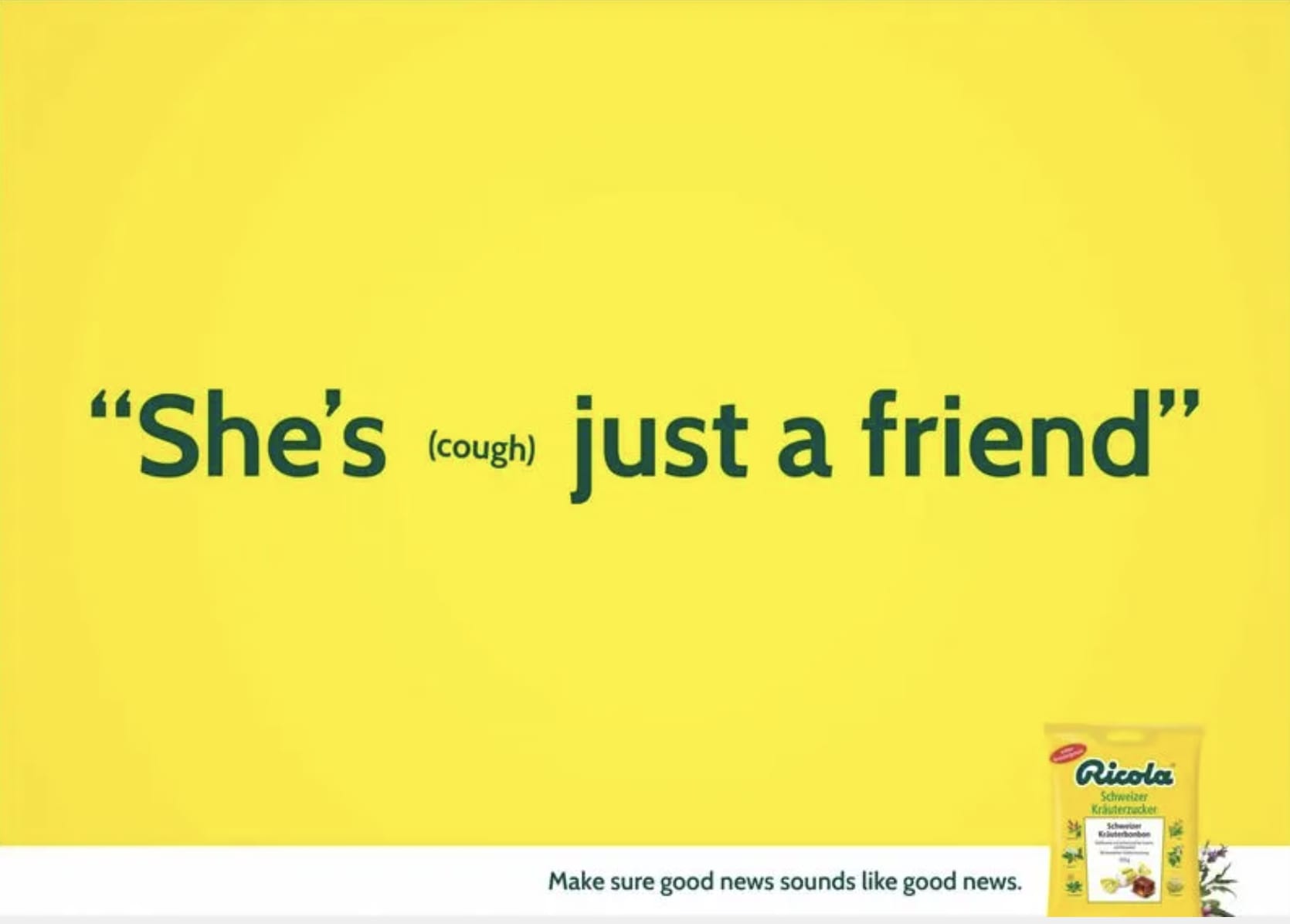
Source: Trend Hunter
Email copywriting is the process of creating persuasive and engaging written content specifically for email marketing campaigns. It aims to capture the reader's attention, convey the intended message, and encourage a desired action, such as making a purchase, signing up for a webinar, or downloading a template.
Imagine a skincare brand launching a new product line. They want to create an email campaign to promote it to their subscribers.
The email copy could start with a captivating subject line like "Unlock the Secret to Flawless Skin." The body of the email would introduce the new product line, highlighting its unique benefits and features.
It could include a brief customer testimonial for social proof and end with a strong call-to-action (CTA), such as "Shop Now" or "Discover the Secret," encouraging readers to click through and explore the new product offering on the brand's website.
Copywriting examples
Let’s explore a few copywriting examples to add to your swipe file.
Mortal Kombucha — copywriting with personality
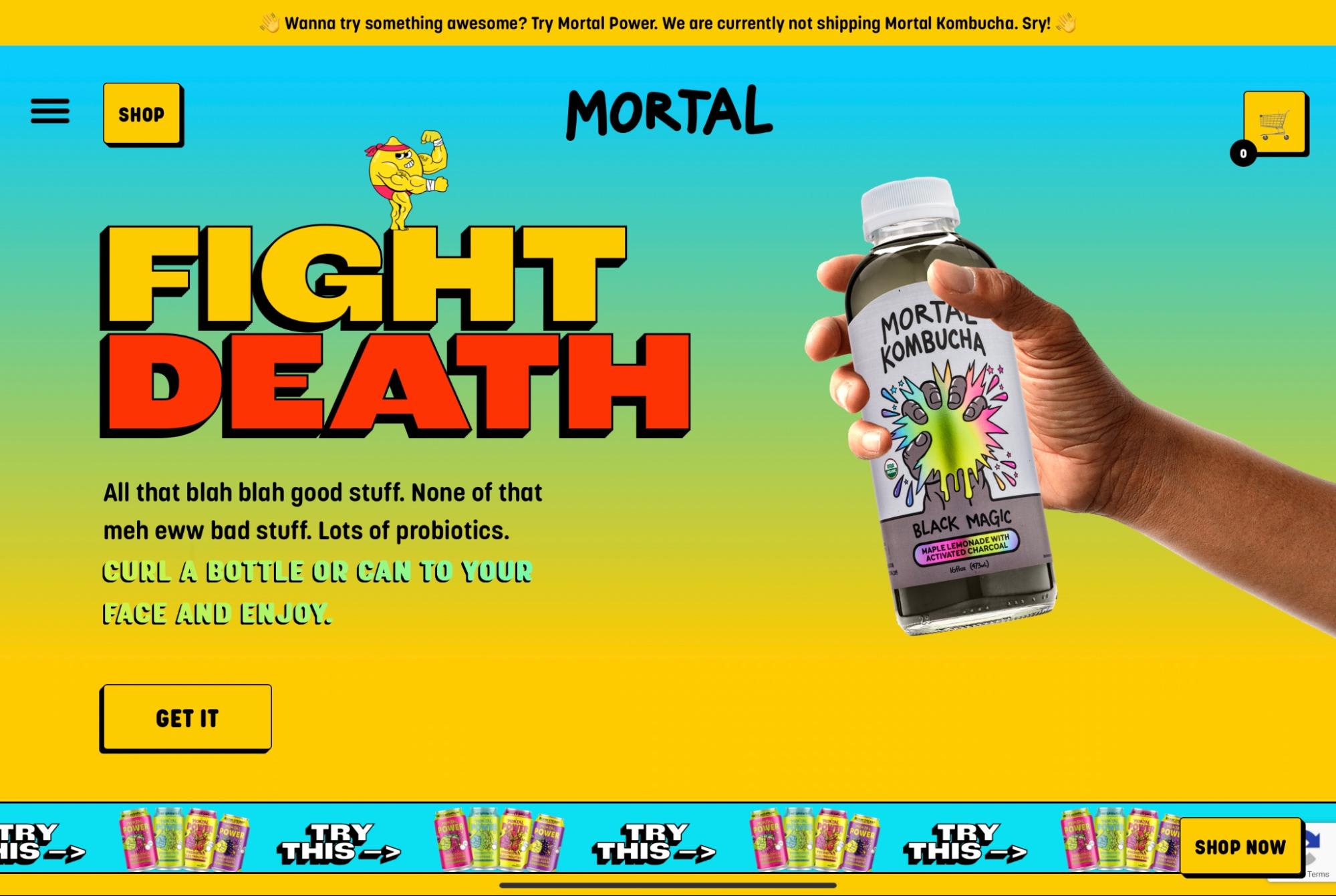
The homepage for Mortal Kombucha is a great example of copywriting with personality. It’s a brand that understands its audience 100%. It uses simple language and is funny and creative, making a Mortal Kombucha brand that’s hard to duplicate, which is hard in ecommerce.
David Ogilvy’s Rolls Royce ad
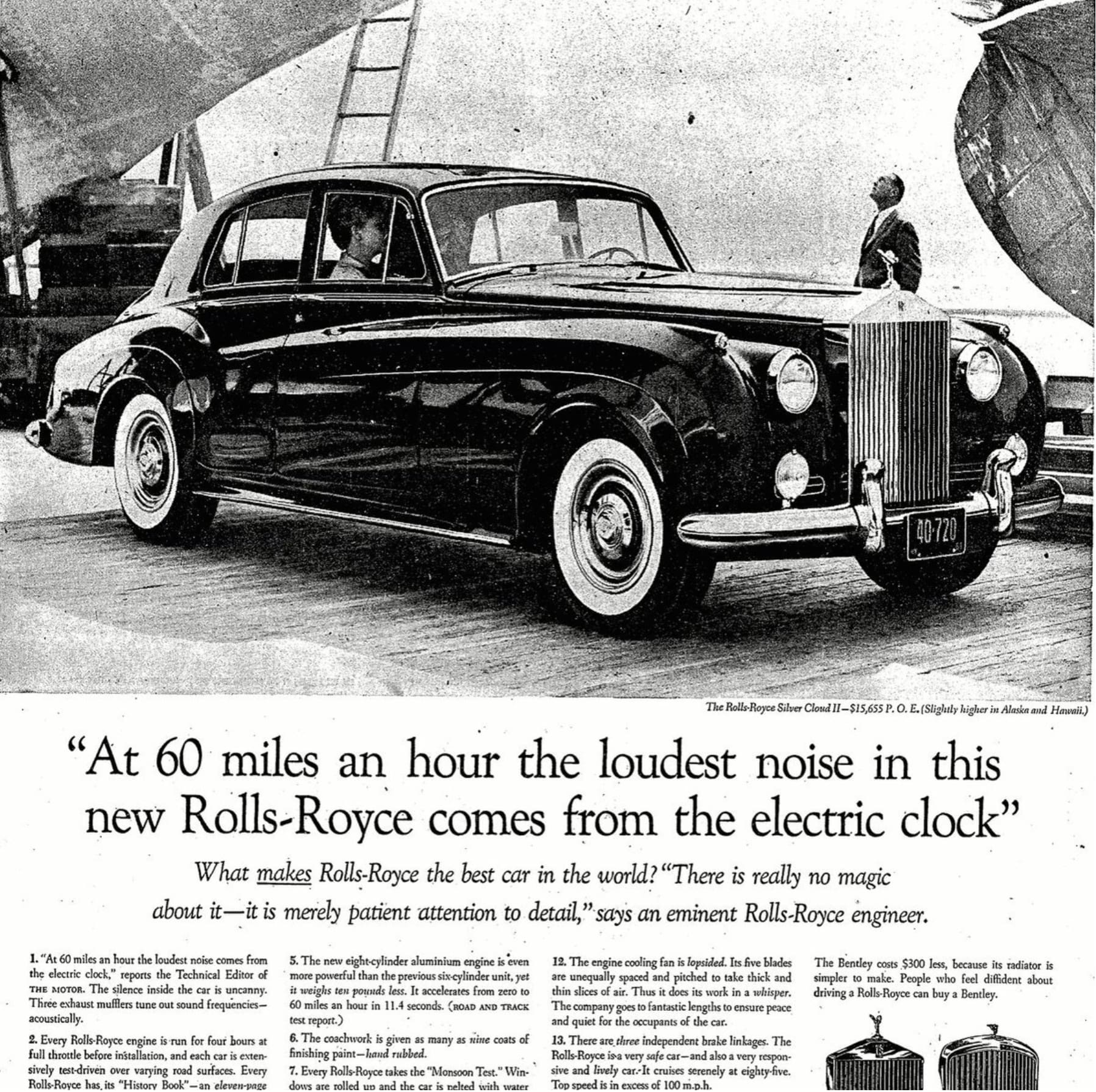
Source: Honey Copy
David Ogilvy, also known as, The “Father of Advertising”, nailed great copywriting when writing this Rolls Royce ad.
The headline communicates what makes the car so special, using words and ideas from people who know the Rolls Royce brand best…its customers.
The headline expresses luxury. The car is so well-engineered that it’s quiet, comfortable, and joyful to drive. When you think about it, Ogilvy isn’t even selling the car itself, he’s selling the driving experience.
The Unofficial Shopify podcast
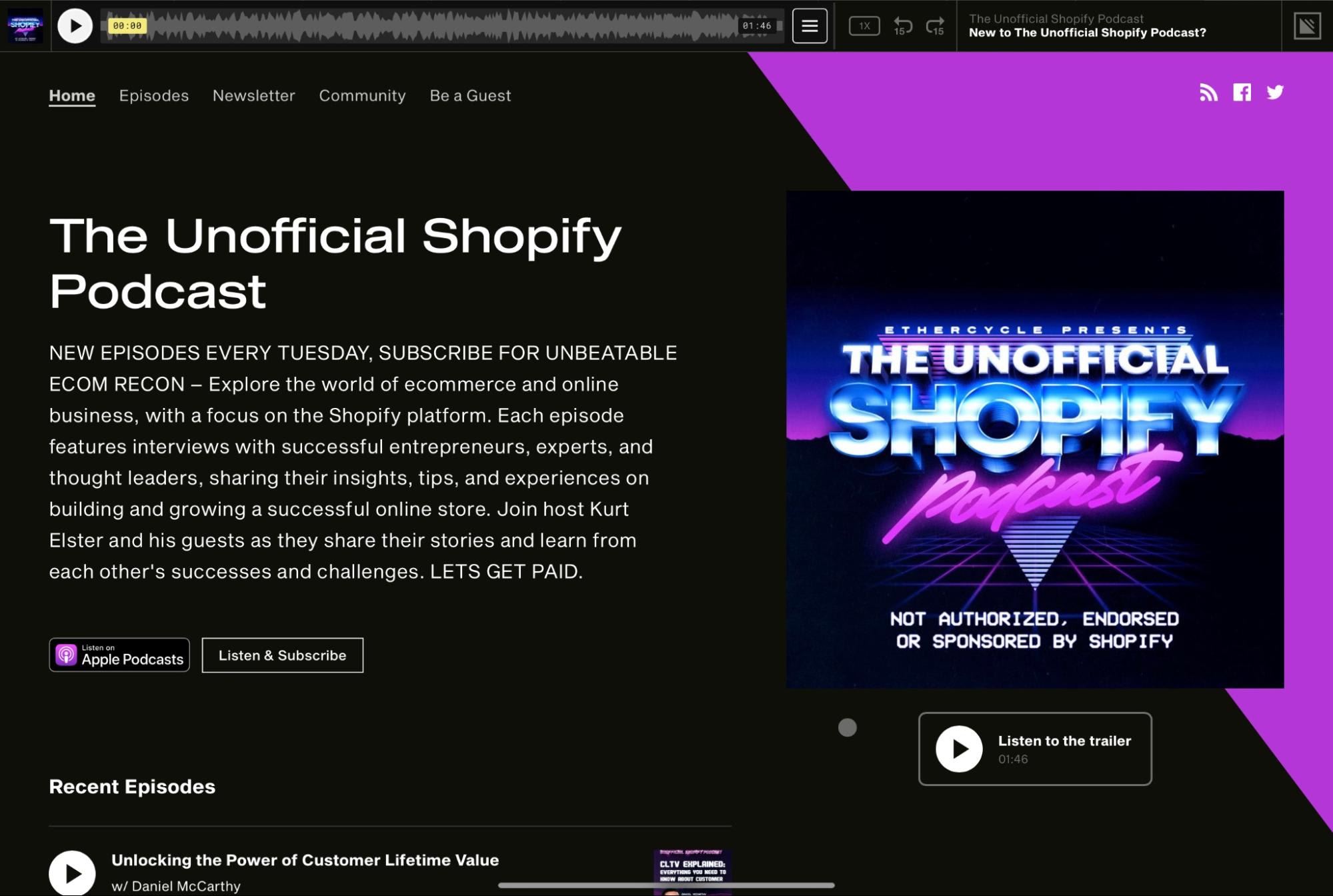
Great copy is helpful in every aspect of business, including podcasts. On The Unofficial Shopify Podcast’s homepage, the copy communicates the true benefits of listening to each episode.
For instance, the copy mentions that you’ll learn from successful ecommerce entrepreneurs and experts, get insights and tips, and grow a successful online store. The last sentence communicates the biggest benefit of all, “LETS GET PAID.”
Covering a variety of benefits paints the full experience people will get from your product or service.
On Running

Source: Really Good Emails
On Running addresses a problem many customers identify with when buying gifts: Complicated running language. The brand uses compelling copy to ease buyer’s fears. It informs the reader that even if you don’t know the lingo, we’ll help you find the best running shoes possible.
Kanban Tool

Kanban Tool is an excellent example of SEO copywriting. Why? Because it ranks on page one on Google for the keyword “kanban software”. This phrase receives 2,400 searches per month, according to Keywords Everywhere.
This is an easy win for Kanban Tool. If someone looks for a visual management solution, they’ll find the brand right away and can explore its features. To achieve this, Kanban Tool has to write copy that’s captivating to people and optimized for search engines.
Find a sales copywriter for hire
HubSpot

HubSpot’s landing page is another great example of effective copywriting. Starting off with the headline, “Grow better with HubSpot,” the messaging is clear, direct, and captures the value proposition of HubSpot’s service. The following text is relevant to the target audience, promising powerful software that isn’t overwhelming and connects data, teams, and customers.
There are clear CTA buttons - "Get a demo" and "Get started free" - which tell visitors exactly what to do next if they're interested. Plus, the statistic at the bottom ("194,000+ customers in over 120 countries grow their businesses with HubSpot") provides social proof, which makes Hubspot look more credible in the eyes of the reader.
Copywriting tips
Wondering how you can improve the copywriting for your business? Here are some of the best practices to keep in mind.
1. Headlines matter
A strong, attention-grabbing headline is crucial for capturing your audience's interest. Spend time crafting a headline that’s clear, relevant, and appealing to your target audience. It can be the difference between a reader engaging with the content or moving on.
2. Focus on the customer
Always prioritize the needs and wants of your target audience. Effective copywriting should address the customer's pain points, desires, and motivations, presenting your product or service as the solution to their problem.
3. Clarity and simplicity
Use clear, concise language and avoid jargon or unnecessary complexity. Your message should be easily understood by your target audience. Remember: people are more likely to engage with and remember content that’s simple and easy to digest.
4. Be persuasive
Use compelling storytelling and persuasive techniques, such as social proof, scarcity, and authority, to build trust with your audience and persuade them to take action. Always focus on the benefits of your product or service, rather than just its features.
5. Use active voice
Active voice makes your copy more engaging and dynamic. It makes your message more clear and direct because the subject performs the action expressed by the verb.
Example:
Passive voice: "A 30% discount is being offered on our products for a limited time."
Active voice: "We're offering a 30% discount on all products for a limited time."
With the active voice example, "we're offering" directly engages the reader and creates a sense of immediacy, which makes it more persuasive.
6. Use the AIDA model
In marketing, AIDA stands for Attention, Interest, Desire, and Action. The goal is to capture the audience's attention, pique their interest, create a desire for the product or service, and then prompt them to take action.
Here’s an example:
Attention: Start with a bold statement or a provocative question. "Are you still wasting money on high-energy bills?"
Interest: Provide some interesting facts or statements that keep the reader engaged. "Our smart thermostat can help you save up to 30% on your energy bills by learning your preferences and adjusting the temperature automatically."
Desire: Build desire by highlighting benefits and creating an emotional connection. "Imagine coming home to the perfect temperature every day, without lifting a finger. Plus, the savings on your energy bills can pay for the device in just a few months!"
Action: End with a strong call to action that tells the reader exactly what to do next. "Order your smart thermostat today and start saving. Click here to buy now!"
7. Include clear calls to action
You can use a call to action (CTA) to get someone to act immediately. CTAs are vital in marketing because they help your audience know what to do next. A reader could be interested in your product, but doesn't know what to do next if there's no clear CTA.
Say you’re writing a landing page for a fitness app. You could use an action-oriented CTA at the end of the page, like:
"Start Your Fitness Journey Today! Download the App for a Free 7-Day Trial."
This is good CTA because it:
Specifies what the reader should do next (download the app)
Offers an incentive (free trial)
Creates urgency (Start your fitness journey today)
8. Analyze Amazon reviews
Analyze Amazon reviews to identify customer needs and preferences. Emphasize praised features, benefits, and use testimonials as social proof. Address concerns from negative reviews by offering solutions or clarifying misconceptions.
This tailored, data-driven approach creates copy that resonates with your target audience, effectively engaging and persuading potential customers.
9. Test and iterate
Good copywriting is a continuous process of testing and refining. Experiment with different headlines, content structures, and persuasive techniques to find what resonates best with your audience. Use data and feedback to optimize your copy for maximum effectiveness.
Good copy should always be edited by a good editor, especially if you’re using an AI tool to create your copy. In this case, we recommend buying an AI content editing service to perfect your copy.
Where to find copywriting jobs
Freelance marketplaces
Freelance marketplaces like Fiverr are designed to connect freelancers with clients who need their services. They cater to a wide range of professionals, from web developers to writers and copywriters.
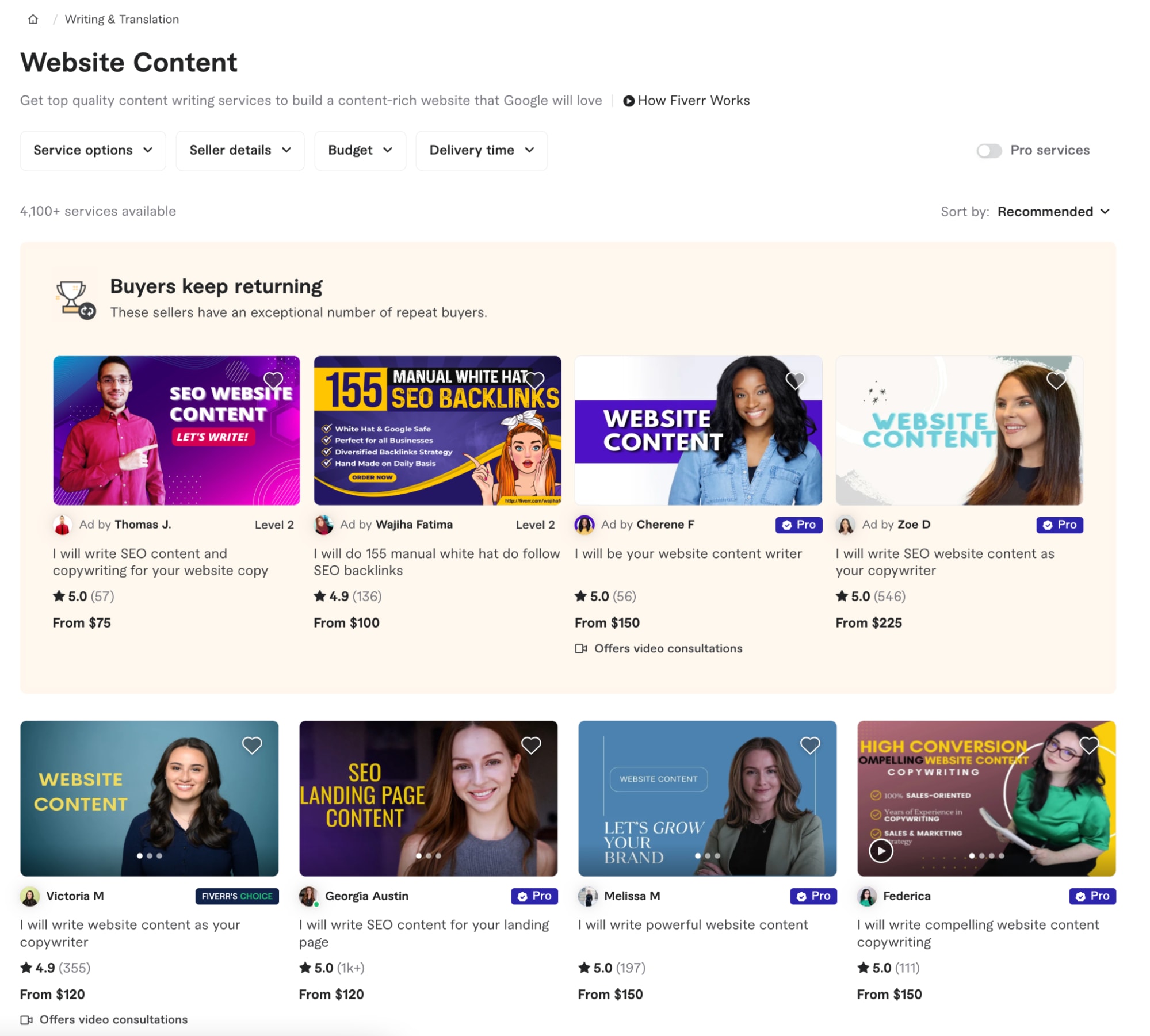
Freelancers selling website content writing services on Fiverr
New copywriters can benefit from these platforms because they don’t need a big portfolio to get started. Seasoned freelancers can leverage their experience and testimonials to secure, higher-paying, long-term projects.
For example, a copywriter on Fiverr might create a gig offering to write a 500-word SEO-optimized blog post for $50. The gig could include add-ons for faster delivery, additional revisions, or longer content at extra costs.
Clients browsing Fiverr can easily compare different freelancers, read reviews, and view samples of their work before making a hiring decision.
Job boards
Copywriters can also look for opportunities on job boards, which are specialized websites where employers post job vacancies to attract talent.
Some job boards allow you to apply directly through their websites, streamlining the application process. You can create a profile, upload your resume, and even track your application status. Some popular job boards include ProBlogger, MediaBistro, and Indeed.
LinkedIn now goes far beyond professional networking. You can share content, read industry news, and even search for full-time and freelance gigs. LinkedIn’s job search features offer a ton of tools to find copywriting jobs, with filters for location, industry, and experience level.
You can also set up job alerts for "freelance copywriter," so you receive notifications about relevant gigs. Say one day you see a post from a startup looking for a copywriter to craft website content. You can apply through the platform using your profile and portfolio.
Professional Associations and Groups
Professional associations and groups are community areas where copywriters can connect, learn, and grow. They offer networking and career development opportunities for copywriters from all experience levels to participate in. Many have exclusive job boards or online forums where you can find freelance opportunities.
Some top groups to join include:
Direct outreach
Reach out directly to businesses, startups, and agencies that need copywriting services. You can do this by sending a pitch or introduction email, showing them your portfolio, and explaining what you can do for them. You can get long-term collaborations by reaching out directly because it shows initiative.
How to become a copywriter step by step
Looking to improve your writing skills and become a professional copywriter? Here’s how:
Develop a strong foundation: Begin by understanding the principles of marketing, advertising, and human psychology. Read classic books on copywriting, such as "Ogilvy on Advertising," as well as works by other advertising legends like Claude Hopkins and Eugene Schwartz. You can also take a copywriting course to learn the basics.
Practice your craft: Write as much as possible to refine your skills. Experiment with different styles and formats, such as direct mail, print ads, and digital content. Learn from the masters by analyzing and dissecting successful ad campaigns.
Build a diverse portfolio: Create a collection of your best work that showcases your copywriting skills and versatility. Include examples of headlines, body copy, and calls-to-action across various industries and media formats. Your portfolio will be your key to attracting potential clients and employers.
Seek mentorship and feedback: Look for experienced copywriters or industry professionals who can provide guidance, critique your work, and offer valuable insights. Join copywriting and advertising communities to network, learn from others, and share your knowledge.
Gain real-world experience: Start by freelancing or interning at an advertising agency or company with a strong marketing focus. This hands-on experience will help you learn the ropes, develop your skills, and understand the challenges and opportunities of working with clients.
Keep learning and adapting: Stay informed about the latest trends and best practices in advertising and copywriting. As the industry evolves, so should your knowledge and skills. Attend workshops, conferences, and courses to continuously sharpen your abilities and stay ahead of the curve.
Promote yourself: Network with professionals in your target industry, attend industry events, and actively engage on social media platforms. Develop a personal brand that showcases your expertise, and use your copywriting skills to create compelling content that promotes your services. Sign up for Fiverr to promote your skills and land more clients.
Cultivate long-term relationships: Once you've established yourself as a professional copywriter, focus on building lasting relationships with clients and colleagues. Deliver high-quality work consistently, communicate effectively, and meet deadlines to ensure your reputation remains strong and your client base continues to grow.
How to interview a copywriter
In order to work with the right copywriter for your project, you must ask the right questions. Establishing a positive and professional relationship with a copywriter is essential.
There needs to be good communication all around. That way, the first job will be a success and then you can move forward with more projects afterward.
Below you'll find a list of suggested questions to ask your potential copywriter. These questions are great steps towards a positive conversation:
Do you have experience writing for my industry? After asking some questions to get to know the interviewee, start asking punctual questions. Start by asking if they have experience in your particular industry. If they say yes, ask what companies they've worked for. If not, ask if they could see it as a problem, or are they willing to take up the challenge.
Do you have an established research process? Next, ask if they have a research process when starting a new project. Copywriters should be able to dig deep into a company to find out the UVP. Pay attention to their research process. If they only ask for a brief, then they might not be the right fit.
Can you show us some writing samples? Ask to see some of their copywriting work. Most will have a selection of their best work on hand. If any of their work is live on the internet, ask to see it. Ask a few more questions about those projects: Are they successful? Are clients seeing good results?
What is your preferred style of copy? Ask the candidate if they have a preferred style of copywriting. Some copywriters prefer a storytelling angle while others lean towards a more technical approach. Either way, they likely have a preference.
Do you have a favorite product or service category to write for? Following the previous question, ask about their preferred category or industry. If it doesn't match your company, don't worry, that doesn't mean they won't do a good job. If they prefer a challenge over something they know a lot about, that's a good sign.
Are you familiar with keyword research and Google results analysis? Some copywriters offer keyword research and analysis, but not all do. In some cases, a copywriter may have some content marketing knowledge and can offer a deeper analysis of different types of keywords and how they perform. Ask if they’re familiar with google results analysis to see if they can make a good assessment as to where your current copy could use a refresh in the right direction.
After interviewing a few candidates and choosing the top one or two, conduct a test to see if they fit the bill. The most efficient process is with a two-part test that’ll determine how suited the candidate is for the job.
Ask them to write something
The best way to know if a potential copywriter will write exactly what you need is to ask them to write something as a test. If what you need is a set of product descriptions, don't ask them to write email copy. Task them with a project similar to the one you need. You'll probably have better results if it's a paid test. You can offer a lower rate than what they ask for just for this process.
The copywriter will do their best work if they feel your testing process is honest and standard practice. Let them know it's something you always do with candidates. Don't diminish their work and ask them to prove themselves. Make sure to be transparent in the process.
Give feedback and analyze their response
But wait, that's not enough. Conduct a second part of the test for better results. Send the copywriter feedback about their work and offer suggestions about how they can improve the copy. Analyze their reaction and see how they go about editing the work with your feedback. This process will show you how they confront constructive criticism.
From the results of this test, you can make a decision if the copywriter is right for the role. Base it on the work they produce and on the answers to your interview questions to determine the best fit for your business.
Hire the best copywriter for your business
Successful copywriting doesn't have to be mysterious or complicated. It takes research, skill, and a deep understanding of your business needs and goals, but the benefits of hiring a good copywriter can’t be overstated.
Hiring a copywriter to help your business saves you time and brings expert skills to your business to have the best impact on your bottom line. A skilled copywriter who’s armed with all the information they need can amplify your marketing efforts and ROI to new heights and curate your brand image for your target audience.
Ready to get started with working with (or as) a freelance copywriter? Sign up to Fiverr today!
Copywriting FAQ
What is copywriting with an example?
Copywriting is the art of crafting persuasive written content that promotes a product, service, or idea. An example would be creating a compelling email campaign to convince customers to buy a new skincare product.
How can a beginner start copywriting?
A beginner can start copywriting by studying the fundamentals of marketing, advertising, and human psychology, and practicing writing different types of copy. They can also build a portfolio, seek feedback from experienced copywriters, and gain real-world experience through internships or freelancing.
What are copywriting skills?
Copywriting skills include the ability to write clear, concise, and engaging content, understanding target audiences, crafting compelling headlines, using persuasive techniques, and adapting to different formats and industries.
What is the difference between copywriting and copyediting?
Copywriting involves creating original written content to promote a product, service, or idea, while copyediting focuses on reviewing and improving existing text for clarity, accuracy, grammar, punctuation, and style, ensuring that the final copy is error-free and consistent.






